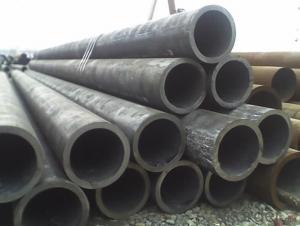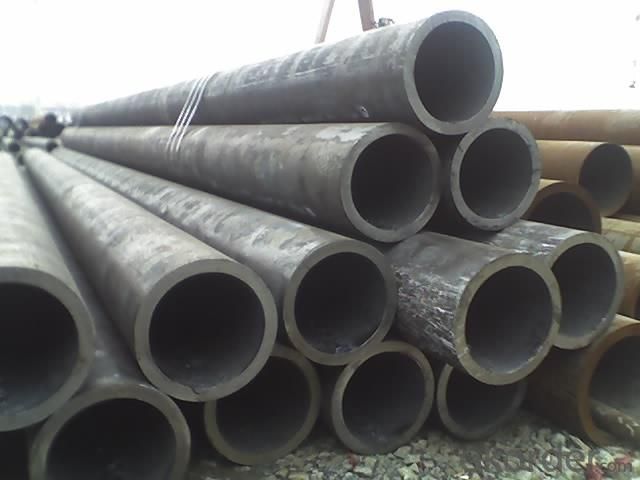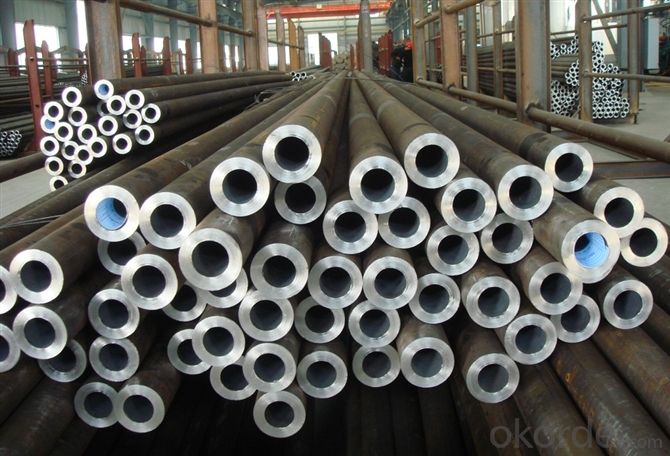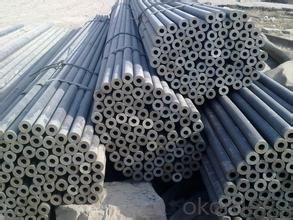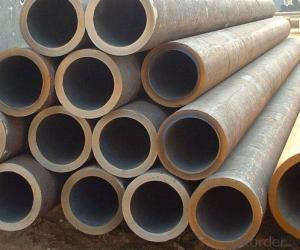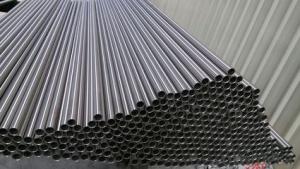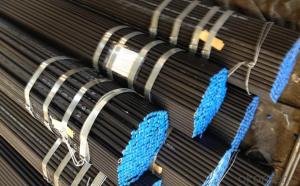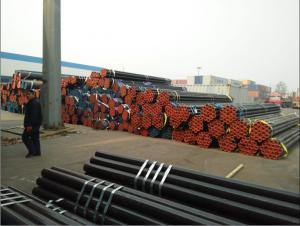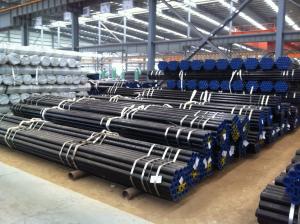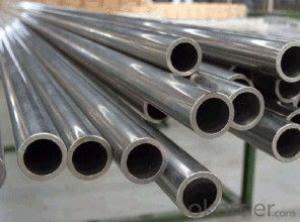Carbon Steel Seamless Pipe For Large OD With Good Quality
- Loading Port:
- Tianjin
- Payment Terms:
- TT or LC
- Min Order Qty:
- 30 m.t.
- Supply Capability:
- 9000 m.t./month
OKorder Service Pledge
OKorder Financial Service
You Might Also Like
1、Structure of Seamless Pipe ASTM A106/53:
Seamless pipe is formed by drawing a solid billet over a piercing rod to create the hollow shell. As the manufacturing process does not include any welding, seamless pipes are perceived to be stronger and more reliable. Historically seamless pipe was regarded as withstanding pressure better than other types, and was often more easily available than welded pipe.
Quality Standard:
ASTM A519 Seamless Carbon and Alloy Steel Mechanical Tubing
JIS G3441 Alloy steel tubes for machine purposes
DIN 2391 Seamless Precision Steel Tubes
EN10305 Steel tubes for precision applications Technical delivery conditions Seamless cold drawn tubes
EN 10297 Seamless circular steel tubes for mechanical and general engineering purposes
2、Main Features of the Seamless Pipe ASTM A106/53:
• High manufacturing accuracy
• High strength
• Small inertia resistance
• Strong heat dissipation ability
• Good visual effect
• Reasonable price
3、Seamless Pipe ASTM A106/53 Specification:
Standard | GB, DIN, ASTM ASTM A106-2006, ASTM A53-2007 |
Grade | 10#-45#, 16Mn 10#, 20#, 45#, 16Mn |
Thickness | 8 - 33 mm |
Section Shape | Round |
Outer Diameter | 133 - 219 mm |
Place of Origin | Shandong, China (Mainland) |
Secondary Or Not | Non-secondary |
Application | Hydraulic Pipe |
Technique | Cold Drawn |
Certification | API |
Surface Treatment | factory state or painted black |
Special Pipe | API Pipe |
Alloy Or Not | Non-alloy |
Length | 5-12M |
Outer Diameter | 21.3-610mm |
Grade | 20#, 45#, Q345, API J55, API K55, API L80, API N80, API P110, A53B |
Standard | ASME, ASTM |
1) Material:20#(ASTM A 106/A53 GRB.API5LGRB,GB),45#,16Mn,10#.
2) Specification range:OD:21.3-610mm,WT:6-70mm,length:6-12m or according to the requirement of clients.
3) Excutive standards:GB,ASME API5L.ASTM A 106/A53,Despite of the above standards,we can also supply seamless steel pipe with standard of DIN,JIS,and so on,and also develop new products according to the requirements of our clients!
4) Surface:black lacquered,varnish coating or galvanized.
5) Ends:Beveled or square cut,plastic capped,painted.
6) Packing:bundles wrapped with strong steel strip,seaworthy packing.
4、Packaging & Delivery
Packaging Details: | seaworthy package,bundles wrapped with strong steel strip |
Delivery Detail: | 15-30days after received 30%TT |
5、FAQ of Seamless Pipe ASTM A106/53:
①How is the quality of your products?
Our products are manufactured strictly according to national and internaional standard, and we take a test
on every pipe before delivered out. If you want see our quality certifications and all kinds of testing report, please just ask us for it.
Guaranteed: If products’ quality don’t accord to discription as we give or the promise before you place order, we promise 100% refund.
②How about price?
Yes, we are factory and be able to give you lowest price below market one, and we have a policy that “ for saving time and absolutely honest business attitude, we quote as lowest as possible for any customer, and discount can be given according to quantity”,if you like bargain and factory price is not low enough as you think, just don’t waste your time.Please trust the quotation we would give you, it is professional one.
③Why should you chose us?
Chose happens because of quality, then price, We can give you both.Additionally, we can also offer professional products inquiry, products knowledge train(for agents), smooth goods delivery, exellent customer solution proposals.Our service formula: good quality+good price+good service=customer’s trust
SGS test is available, customer inspection before shipping is welcome, third party inspection is no problem.
6、Seamless Pipe ASTM A106/53 Images:
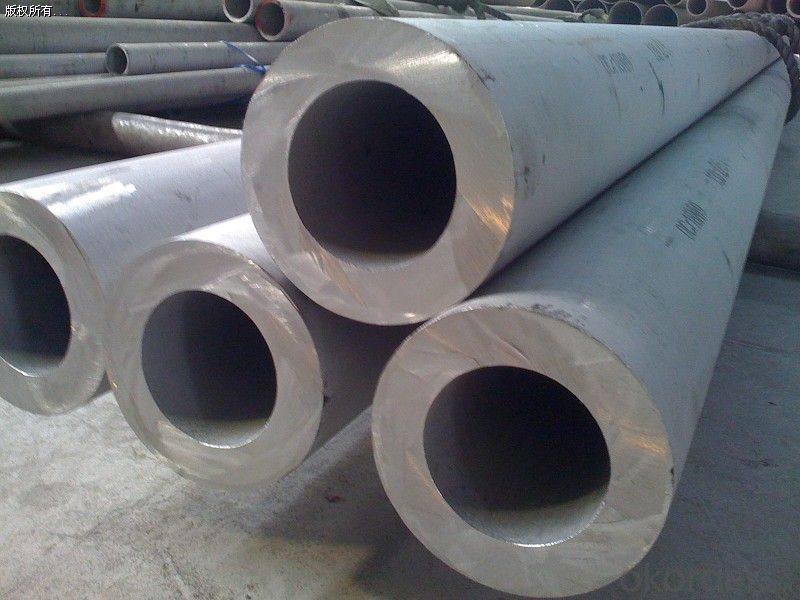
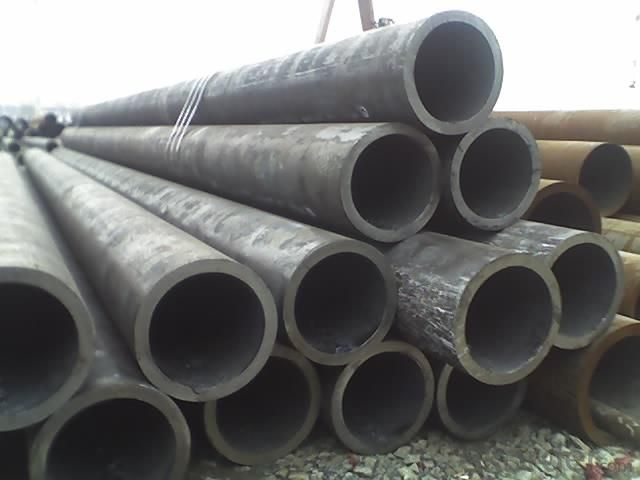
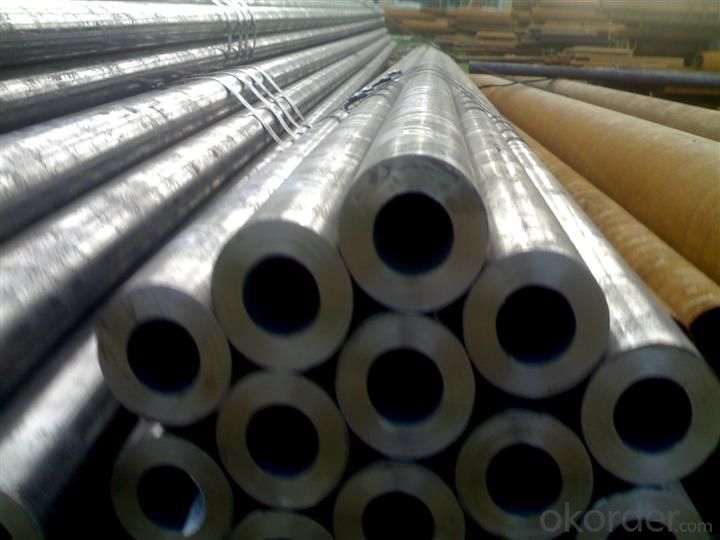
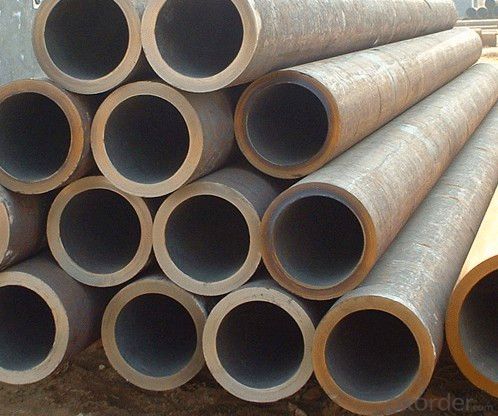
- Q: What does GALV mean in a steel tube?
- GALV is the abbreviation of English galvanized (Galvanized), which means galvanized steel pipe.
- Q: How much is 4 inches steel tube MM?
- 1 inches =25.4 mm;4 inches =101.6 mm;The specification of steel pipe is usually nominal size;
- Q: How are steel pipes used in the manufacturing of shipbuilding and offshore structures?
- Steel pipes are essential components in the manufacturing of shipbuilding and offshore structures. They are widely used due to their strength, durability, and resistance to corrosion, making them ideal for the harsh marine environment. In shipbuilding, steel pipes are used for various purposes. One of the main applications is in the construction of the hull, the framework that provides structural support to the ship. Steel pipes are used to form the keel and the frames, which help to maintain the shape and strength of the hull. These pipes are welded together to create a robust and rigid structure that can withstand the forces exerted on the ship during navigation. Moreover, steel pipes are used in the construction of various systems onboard the ship. For instance, they are utilized in the piping system for transporting fluids like fuel, water, and oil throughout the vessel. Steel pipes are also employed in the ventilation and air conditioning systems, ensuring proper airflow and temperature control within the ship. In offshore structures, such as oil rigs and platforms, steel pipes play a crucial role. These structures are typically subjected to extreme environmental conditions, including severe weather, high pressure, and corrosive saltwater. Steel pipes are used to fabricate the legs, risers, and other load-bearing components of offshore structures. These pipes provide the necessary strength and stability, allowing the structure to withstand the forces exerted by waves, wind, and drilling operations. Additionally, steel pipes are utilized in the construction of subsea pipelines. These pipelines are used to transport oil, gas, and other fluids from offshore drilling sites to onshore facilities. Steel pipes are preferred due to their high tensile strength and ability to withstand the high pressure and corrosive conditions found in subsea environments. Overall, steel pipes are indispensable in the manufacturing of shipbuilding and offshore structures. Their exceptional strength, durability, and corrosion resistance make them the preferred choice for constructing hulls, systems, and load-bearing components. Without steel pipes, the construction of ships and offshore structures would be significantly compromised in terms of safety, reliability, and longevity.
- Q: How are steel pipes used in the construction of pipelines?
- Steel pipes are commonly used in the construction of pipelines due to their durability, strength, and resistance to corrosion. These pipes are welded together to form a continuous line, allowing fluids or gases to be transported over long distances. The steel pipes are essential for ensuring a reliable and efficient flow of materials, such as oil, gas, or water, in various industries, including oil and gas, water supply, and infrastructure development.
- Q: How are steel pipes used in the agriculture industry?
- Steel pipes are used in various ways within the agriculture industry. They are commonly used for irrigation systems, allowing water to be efficiently transported to crops. Steel pipes are also used for drainage systems, ensuring excess water is properly removed from fields. Additionally, steel pipes are used for building structures such as barns, fences, and animal enclosures, providing durability and strength.
- Q: How are steel pipes used in the wastewater treatment industry?
- Steel pipes are commonly used in the wastewater treatment industry for various purposes, including the transportation of wastewater from one area to another, the distribution of treated water to different locations, and the construction of infrastructure such as pumping stations and treatment plants. Due to their durability, resistance to corrosion, and ability to withstand high pressure, steel pipes are essential components in the efficient and reliable operation of wastewater treatment systems.
- Q: What are the different joining methods for steel pipes?
- The different joining methods for steel pipes include welding, threaded connections, flanges, and grooved connections.
- Q: What's the difference between hot dip galvanizing and cold galvanizing? Which kind of galvanizing method is good?
- Cold galvanizing is zinc plating, the general surface is relatively smooth, no zinc flowers, there are two kinds of resistance to fingerprints and non - Fingerprint
- Q: How are steel pipes used in the manufacturing of furniture?
- Steel pipes are commonly used in the manufacturing of furniture to provide structural support, such as in the construction of chair and table frames. They are also used as a base for attaching other materials, such as wood or fabric, and can be bent, shaped, and welded to create various designs and styles.
- Q: Can steel pipes be used for drainage systems?
- Yes, steel pipes can be used for drainage systems. Steel pipes are durable, strong, and resistant to corrosion, making them suitable for various applications, including drainage systems. They can effectively transport water and waste materials, ensuring efficient drainage.
Send your message to us
Carbon Steel Seamless Pipe For Large OD With Good Quality
- Loading Port:
- Tianjin
- Payment Terms:
- TT or LC
- Min Order Qty:
- 30 m.t.
- Supply Capability:
- 9000 m.t./month
OKorder Service Pledge
OKorder Financial Service
Similar products
Hot products
Hot Searches
Related keywords
